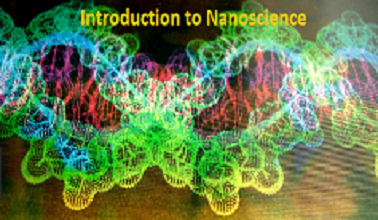

Note: Please check your Spam or Junk folder, in case you didn't receive the email with verification code.
Non-Linear: Random Order
Course Description
The course enables one to
1. Get familiar with the history associated with the development of the field of nano science.
2. Get Familiar with the key technological advances which facilitated the advancement of the field.
3.Understand the underlying reasons for the unique properties associated with nano materials.
4.Understand the current and potential applications of these materials in the various areas of biomedicine, biotechnology, materials science, electronics, photonics, agriculture, energy production, enhanced catalysis, biosensors and micro fluidics.
5.Get familiar with the instrumentation and technologies currently utilized to manipulate and fabricate a variety of nano materials currently in use or under investigation.
Objectives
1.Will familiarize about the science of nano materials
2.Will demonstrate the preparation of nano materials
3.Will develop knowledge in characteristic nano materials.
 1.1 Introduction - Nano-scale Science and Technology
1.1 Introduction - Nano-scale Science and Technology
 1.2 Implication for Physics, Chemistry, Biology and Engineering
1.2 Implication for Physics, Chemistry, Biology and Engineering
 1.3 Classifications of nano-structured materials - nano particles - quantum dots
1.3 Classifications of nano-structured materials - nano particles - quantum dots
 1.4 Length Scales involved and effect on properties Mechanical
1.4 Length Scales involved and effect on properties Mechanical
 1.5 Introduction to properties and motivation for study
1.5 Introduction to properties and motivation for study
 Introduction to Nanoscience
10 Questions
Introduction to Nanoscience
10 Questions
 2.1 Preparation Methods Bottom-up Synthesis -Top-down Approach
2.1 Preparation Methods Bottom-up Synthesis -Top-down Approach
 2.2 Precipitation - Mechanical Milling
2.2 Precipitation - Mechanical Milling
 2.3 Colloidal Routes - Self Assembly
2.3 Colloidal Routes - Self Assembly
 2.4 Vapour phase deposition, MOCVD, Sputtering, Evaporation
2.4 Vapour phase deposition, MOCVD, Sputtering, Evaporation
 2.5 Molecular beam Epitaxy, Liquid Phase Epitaxy (LPE) - MOMBE
2.5 Molecular beam Epitaxy, Liquid Phase Epitaxy (LPE) - MOMBE
 Preparation Methods
10 Questions
Preparation Methods
10 Questions
 3.1 Patterning And Lithography For Nano scale Devices
3.1 Patterning And Lithography For Nano scale Devices
 3.2 X-ray Lithography systems and processes
3.2 X-ray Lithography systems and processes
 3.3 Wet etching - Dry (Plasma Reactive Ion) Etching
3.3 Wet etching - Dry (Plasma Reactive Ion) Etching
 3.4 Etch resists-dip pen lithography
3.4 Etch resists-dip pen lithography
 Patterning And Lithography
10 Questions
Patterning And Lithography
10 Questions
 4.1 Preparation Environments Clean Rooms Specifications And Design
4.1 Preparation Environments Clean Rooms Specifications And Design
 4.2 Vibration free environments Services and facilities required
4.2 Vibration free environments Services and facilities required
 4.3 Working Practices, Sample Cleaning, Chemical Purification
4.3 Working Practices, Sample Cleaning, Chemical Purification
 4.4 Chemical And Biological Contamination, Safety Issues, Flammable
4.4 Chemical And Biological Contamination, Safety Issues, Flammable
 Preparation Environments
10 Questions
Preparation Environments
10 Questions
 5.1 Characterization Techniques X-ray diffraction technique
5.1 Characterization Techniques X-ray diffraction technique
 5.2 Scanning Electron Microscopy - Environmental Techniques
5.2 Scanning Electron Microscopy - Environmental Techniques
 5.3 Transmission Electron Microscopy Including High-Resolution Imaging
5.3 Transmission Electron Microscopy Including High-Resolution Imaging
 5.4 Surface Analysis Techniques- AFM, SPM, STM, SNOM, ESCA
5.4 Surface Analysis Techniques- AFM, SPM, STM, SNOM, ESCA
 Characterization Techniques
10 Questions
Characterization Techniques
10 Questions
 Final Assessment
20 Questions
Final Assessment
20 Questions
The certificate issued for the Course will have
Only the e-certificate will be made available. No Hard copies. The certificates issued by Global uLektz Academy. can be e-verifiable at www.ulektzskills.com/verify.



 60 hours Learning Content
60 hours Learning Content 100% online Courses
100% online Courses English Language
English Language Certifications
Certifications